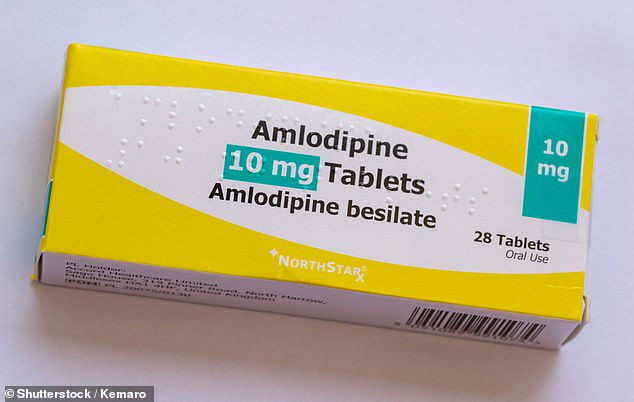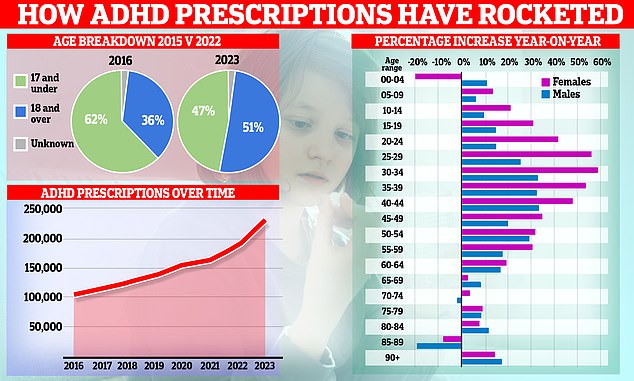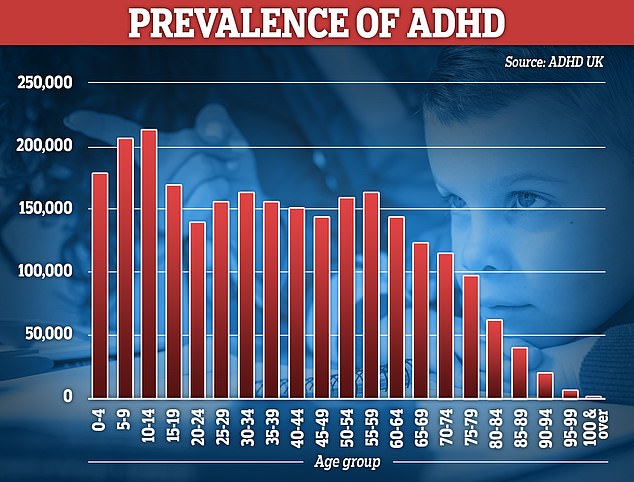- EXPLORE FURTHER: Specialists caution that certain AirPods might set off a frightening neurological condition.
Research now suggests that a widely used blood pressure medication, taken by millions of people in Britain, might significantly alleviate one of the most disabling symptoms of ADHD.
The medications currently accessible for this condition come with notable side effects such as headaches, disrupted sleep patterns, and loss of appetite. Approximately one-quarter of patients do not respond positively to any ADHD drugs.
However, amlodipine, when taken every day, might be equally effective at reducing hyperactivity with minimal notable side effects, according to scientists' beliefs.
The research conducted on zebrafish — creatures that have 70 percent of their genetic makeup similar to ours — revealed that amlodipine has the ability to counteract neurons in the brain that emit excessive electrical impulses, leading to overexcitement.
Specialists who deemed the results 'encouraging' mentioned that the medication might provide a more secure therapeutic choice for individuals suffering from ADHD.
Dr. Matthew Parker, who co-authored the study and serves as a senior lecturer in neuroscience at the University of Surrey, commented: "Repositioning amlodipine—a widely recognized hypertension drug—provides an encouraging and expedited route for tackling ADHD symptoms."
'Ours findings suggest that because of its current approved status and safety record, amlodipine might quickly be repurposed as an alternative therapy for ADHD, possibly offering assistance to patients faster than creating new drugs.'
Amlodipine, priced at 4p per tablet, is prescribed to individuals suffering from hypertension to help prevent cardiovascular diseases, including heart attacks and strokes.


It reduces blood pressure through the relaxation and dilation of blood vessels, thereby facilitating the heart’s ability to circulate blood throughout the body.
Individuals with ADHD may experience severe symptoms such as trouble focusing, constant fidgeting, and reduced ability to manage impulses.
The group of scientists from the United Kingdom, Iceland, and Germany mentioned regarding their most recent discoveries: ' A substantial primary impact was observed. with amlodipine resulting in fewer impulsive reactions exhibited by the fish.
Writing in the journal Neuropsychopharmacology They also mentioned that this occurred due to amlodipine reducing neuronal activity.
Scientists subsequently investigated the impact of amlodipine on British individuals who had already been diagnosed with ADHD.
Leveraging information from the UK Biobank health initiative, researchers found that more than fifty individuals who were using amlodipine also mentioned taking drugs commonly prescribed for ADHD.
These patients reported fewer mood fluctuations and reduced risk-taking behavior compared to individuals using other blood pressure medications such as ramipril, which is marketed under the brand name Tritace, according to the researchers.
NHS Statistics indicate that over 230,000 individuals in England are currently receiving this treatment. ADHD medications to address their issues with attention and hyperactivity.

Last year saw prescription rates increase by twenty percent, representing the largest yearly jump since contemporary records started in 2015.
The data indicates that this trend is primarily driven by an increase among women in their 20s and 30s, despite ongoing rises in younger children as well.
Specialists have cautioned that unscrupulous private clinics may be misdiagnosing this condition excessively and have raised concerns about the common use of potent stimulants for treatment.
Typical side effects associated with these medications—Ritalin being the most recognized among them—encompass restlessness and irritability, sleepiness, lightheadedness, loose stools, as well as queasiness and throwing up.
The rapidly growing market is believed to have been driven by celebrities like model Katie Price and Love Island star Olivia Attwood Discussing their struggles with ADHD and the wait times of up to ten years for an evaluation through the NHS.
Social media platforms abound with users sharing how medications have assisted them in calming down, managing their restlessness, and enhancing their focus.
However, experts have contended that ADHD was first recognized in the UK as an adult disorder in 2008.
Until then, it was considered merely a childhood issue that children would eventually grow out of.
Consequently, instead of being overly diagnosed, several experts argue that numerous adults currently receiving an ADHD diagnosis may have had their symptoms overlooked for many years.
Read more